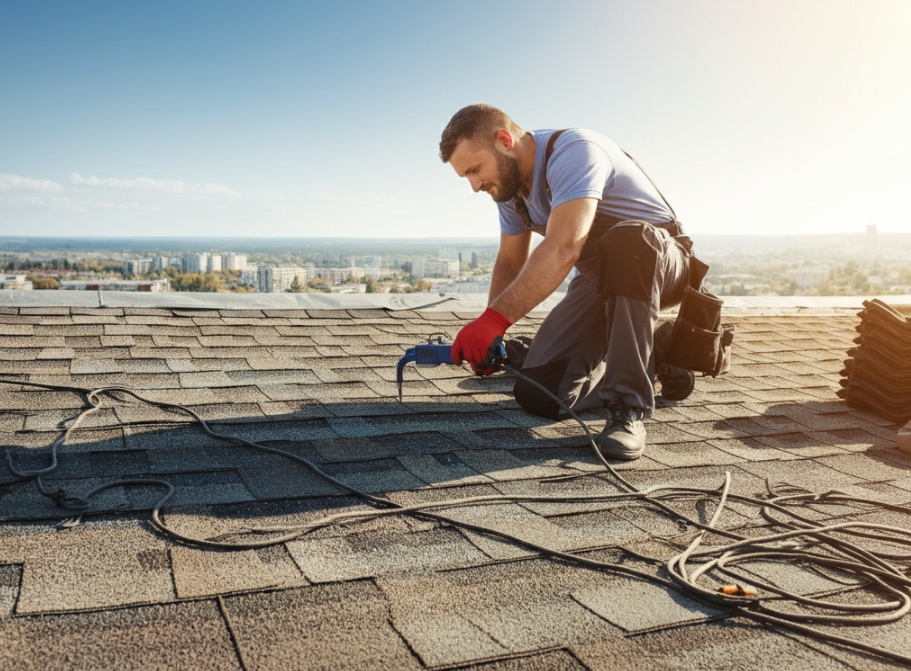When managing a property, one of the most critical aspects to ensure tenant satisfaction and asset longevity is roof maintenance. From unexpected leaks to winter damages and everything in between, your property’s roof is its first line of defense against the elements, making upkeep essential for landlords, tenants, and property managers alike.
This guide will break down the importance of roof repair and maintenance, highlight common issues, and share actionable tips for handling roofing needs. Whether you own a single-family rental, manage a multi-unit complex, or are a tenant wondering where responsibility lies, this post will demystify the role roofing plays in successful property management.
Why Roof Maintenance Is Essential
Protecting Your Investment
Your property’s roof is much more than a cosmetic element; it’s a protective shield. Roof neglect allows minor problems to grow, which can turn a small leak into costly structural damage. Well-maintained roofs not only preserve your property’s integrity but also increase its value. Potential buyers or tenants are much more likely to choose a property with a sturdy, well-maintained roof.
Saving Long-Term Costs
Regular roof maintenance is a proactive way to avoid significant financial headaches. According to HomeAdvisor, the average roof replacement costs $8,000–$14,000, depending on materials and size. On the other hand, routine roof inspections and minor repairs cost a fraction of that. Roofing contractors often emphasize that catching small issues early prevents them from evolving into expensive problems.
Safety and Tenant Satisfaction
A neglected roof can lead to moisture damage, mold growth, or even collapsing structures in severe cases, putting your tenants at risk. Regularly maintained roofs give tenants peace of mind and demonstrate that you’re an attentive landlord or property manager. Satisfaction leads to lease renewals and reduced vacancy periods.
Legal and Insurance Compliance
Ignoring roof repairs can put you at risk of violating local regulations or lease agreements. Many insurance policies require proof of ongoing roof maintenance to qualify for claims in the event of damage. Skipping maintenance may void your insurance coverage on claims for preventable issues.
Common Roofing Issues to Watch For
Roof problems often start out small but become severe if unaddressed. Here are some of the most common roofing issues landlords, tenants, and property managers encounter:
1. Leaks and Moisture
Leaks often develop from cracked shingles, damaged flashing, or worn roofing materials. Damp spots on ceilings or unusual smells could be signs of a leak.
2. Moss and Algae Growth
Moss and algae are particularly common in shaded areas or wetter climates. They retain moisture, which can degrade roofing materials over time.
3. Damaged Flashing
Flashing seals the joints where the roof meets walls, chimneys, or vent pipes. If flashing is damaged, water can seep in, causing structural damage.
4. Ponding Water
Pooling water on a flat or low-sloped roof can lead to sagging, leaks, and mold growth.
5. Cracked or Missing Shingles
Shingles protect the underlayment and wood beneath. If they crack, curl, or fall off, the roof becomes exposed to further damage.
6. Ice Dams in Winter
Ice dams form when melted snow refreezes near the edges of the roof, creating blockages that restrict water drainage. This can lead to leaks and water damage.
Roof Repair vs. Roof Maintenance
Many property managers and landlords struggle to distinguish between roof repair and roof maintenance. While both are crucial, it’s important to know when each applies.
Roof Maintenance
Roof maintenance involves regular inspections and minor upkeep to keep the roof functional and prevent potential problems. Tasks include:
- Clearing gutters of debris to prevent clogs and water accumulation.
- Inspecting for moss or algae and removing it promptly.
- Scheduling annual or biannual inspections with professional roofing contractors.
Consider roof maintenance as ongoing care that prolongs your roof’s lifespan.
Roof Repair
Roof repairs are necessary when existing damage must be addressed. They might include:
- Patching leaks and filling gaps.
- Replacing cracked or missing shingles.
- Repairing or replacing damaged flashing.
Think of roof repair as problem-solving. The goal is to restore the roof to good condition after an issue arises.
When Should You Call Roofing Contractors?
Knowing when to tackle an issue personally and when to hire a professional is vital. Minor maintenance can often be managed in-house, but you should call roofing contractors in the following situations:
- When a roof exceeds its expected lifespan (typically 20-30 years for shingles).
- After severe storms or weather events.
- If you notice widespread damage, such as missing shingles across multiple sections.
- When the source of a leak is unclear.
- For annual inspections or audits.
Qualified Roofing Companies not only bring expertise but also have access to professional-grade materials and safety equipment. They can spot hidden problems (like structural damage) that might go unnoticed during a DIY inspection.
Tips for Proactive Roof Maintenance
1. Schedule Biennial Inspections:
Arrange an inspection every 6–12 months, or after extreme weather conditions, to keep on top of potential problems.
2. Keep Gutters Clean:
Clogged gutters can lead to water damage, so ensure they’re cleaned regularly, especially after autumn leaves have fallen or heavy storms.
3. Trim Overhanging Branches:
Overhanging branches can scrape the roof or fall during windy weather, damaging shingles and causing leaks. Trimming them back reduces these risks.
4. Address Repairs Promptly:
Whether it’s a missing shingle or damaged flashing, don’t delay repairs. Minor repairs now save you from costly replacements later.
5. Use Preventative Coatings:
Many roofing professionals recommend protective coatings to extend a roof’s lifespan by adding a waterproof barrier.
6. Document Everything:
Keep track of all maintenance and repair work. This documentation can help with insurance claims and provide proof of upkeep for tenants or auditors.
Building a Relationship with a Trusted Roofing Contractor
Rather than waiting for emergencies, it’s a good idea to build a relationship with a trusted, local roofing contractor. Contractors familiar with your property can offer personalized recommendations and faster service during emergencies.
When selecting a roofing contractor, consider the following:
- Look for contractors that are licensed, insured, and experienced in your property’s specific roof type.
- Request references or read online reviews.
- Get a written estimate before authorizing repairs or work.
- Choose contractors who place a strong emphasis on safety, including using appropriate equipment and following OSHA standards.
A dependable roofing partner can alleviate much of the stress property managers and landlords face when maintaining their buildings.
Don’t Neglect Your Roof’s Potential
Your roof is more than just a structural element; it’s a key player in protecting your investment and keeping tenants happy. Don’t wait for minor problems to spiral into costly disasters. Regular roof maintenance and prompt repairs ensure your property stays in great condition while reducing liability.
For landlords and property managers looking to take the worry out of roof care, start by booking an inspection with experienced roofing contractors in your area. Stay proactive, prioritize maintenance, and give your property the solid foundation it deserves.





























